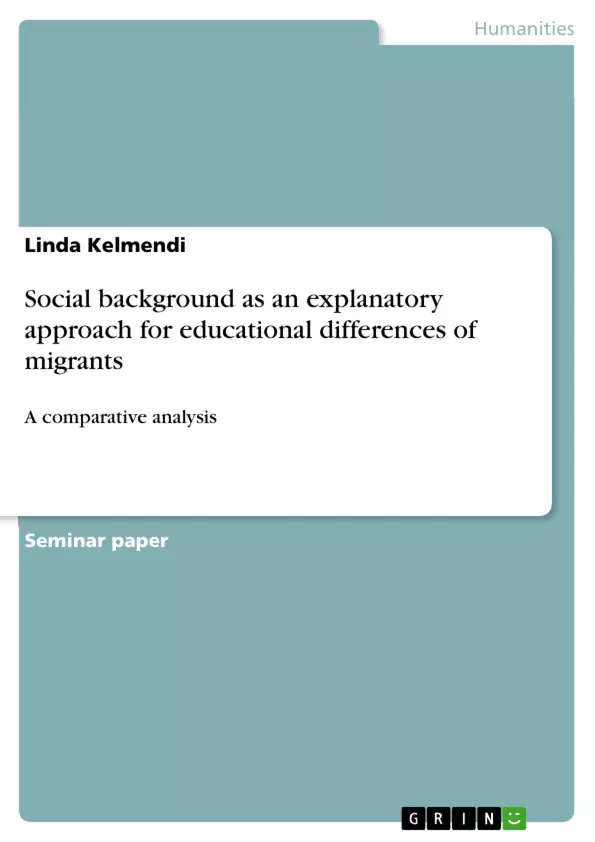The research question reads as follows: how does second generation migrants’ social background influence their educational opportunities? In order to answer the posed research question, the influence of socioeconomic factors on educational inequalities must first be embedded into context regarding different explanations for unequal educational opportunities.
Following this, the theoretical link between the influence of social origin and educational opportunities shall be created with reference to Bourdieu’s theory of the habitus. The following section pays attention to the operationalization of social
background. Indicators for the social background are being discussed and derived from the theory of primary and secondary effects of social background. Finally, a comparative analysis of the influence of social background on educational inequalities shall be conducted by reference to two studies.
Table of Contents
- 1 Introduction
- 2 Theoretical framework
- 3 Operationalization
- 4 Case selection
- 5 Analysis
- 6 Conclusion
- 7 Prospects
Objectives and Key Themes
This research paper investigates how the social background of second-generation migrants influences their educational opportunities. It aims to understand the underlying factors contributing to educational inequalities within this population. The study uses a comparative approach, analyzing the impact of socioeconomic factors within the context of existing theories of educational inequality.
- The impact of social background on educational attainment among second-generation migrants.
- The role of socioeconomic factors in explaining educational inequalities.
- Application of Bourdieu's theory of habitus to understand the link between social background and educational opportunities.
- A comparative analysis of different migrant groups and their educational experiences.
- The distinction between status-related and migration-related explanations for educational disparities.
Chapter Summaries
1 Introduction: This chapter introduces the topic of migration and its impact on education, highlighting the existing educational disadvantages faced by migrants and their children. It establishes the research question: How does second-generation migrants' social background influence their educational opportunities? The chapter sets the stage for the subsequent exploration of theoretical frameworks and methodologies used to address this crucial issue.
2 Theoretical framework: This chapter delves into the theoretical underpinnings of the research, focusing on the status-related approach to explaining educational inequality. It differentiates this approach from a migration-related approach, emphasizing the role of socioeconomic factors in shaping educational outcomes. Boudon's theory of primary and secondary effects of social background is introduced, along with Bourdieu's concept of habitus as a framework for understanding how social background influences individual actions and choices related to education. The chapter lays the groundwork for analyzing how family resources and societal structures interact to produce educational inequalities among migrant populations.
Keywords
Second-generation migrants, educational inequality, socioeconomic background, Bourdieu's habitus, primary and secondary effects, social capital, cultural capital, comparative analysis, integration.
Frequently Asked Questions: Language Preview of Research Paper on Second-Generation Migrants and Educational Opportunities
What is the focus of this research paper?
This research paper investigates how the social background of second-generation migrants influences their educational opportunities. It aims to understand the underlying factors contributing to educational inequalities within this population using a comparative approach and existing theories of educational inequality.
What are the key themes explored in this research?
Key themes include the impact of social background on educational attainment among second-generation migrants; the role of socioeconomic factors in explaining educational inequalities; the application of Bourdieu's theory of habitus; a comparative analysis of different migrant groups and their educational experiences; and the distinction between status-related and migration-related explanations for educational disparities.
What theoretical frameworks are used in this research?
The research utilizes a status-related approach to explaining educational inequality, differentiating it from a migration-related approach. It incorporates Boudon's theory of primary and secondary effects of social background and Bourdieu's concept of habitus to understand how social background influences educational choices.
What is the structure of the research paper?
The paper is structured as follows: Introduction, Theoretical Framework, Operationalization, Case Selection, Analysis, Conclusion, and Prospects. The provided preview includes chapter summaries, outlining the key content of each chapter.
What are the key findings (as summarized in the preview)?
The preview does not present specific findings, but rather outlines the research questions, methodology, and theoretical framework used to analyze the relationship between second-generation migrants' social background and their educational opportunities. Detailed findings would be presented in the full research paper's analysis chapter.
What are the keywords associated with this research?
Keywords include: Second-generation migrants, educational inequality, socioeconomic background, Bourdieu's habitus, primary and secondary effects, social capital, cultural capital, comparative analysis, integration.
What is the purpose of the "Operationalization" and "Case Selection" chapters (not fully detailed in the preview)?
The "Operationalization" chapter would detail the specific methods and measures used to collect and analyze data related to the research question. The "Case Selection" chapter would explain the criteria used to select the specific cases (individuals or groups) studied in the research.
Where can I find the full research paper?
The provided text is a preview. The location of the full research paper is not specified in this preview.
- Citation du texte
- Linda Kelmendi (Auteur), 2017, Social background as an explanatory approach for educational differences of migrants, Munich, GRIN Verlag, https://www.grin.com/document/470869



